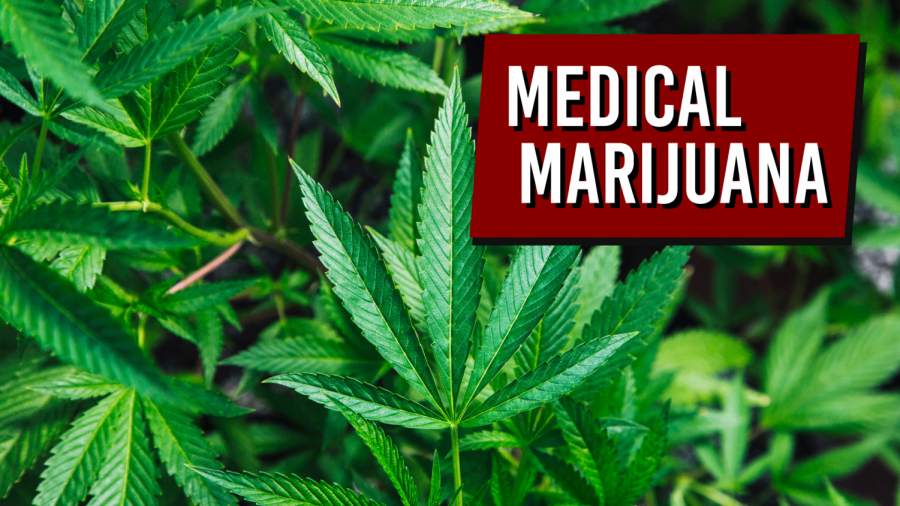Coroner sees promise in medical marijuana
April 16, 2019
In the first few weeks Dr. Charles Feicht and Judean LeRoy, DNP, began offering marijuana as an alternative medicinal recommendation, nearly 30 patients have been treated.
While marijuana is certainly not a new drug, it is new to the medical field in the State of Ohio since its legalization in September 2016.
Although medical marijuana still faces many legal technicalities, including the inability for physicians to prescribe the drug, the ability for employers to take disciplinary action against employees who fail drug tests and the possibility of being denied worker’s compensation if using cannabis medically, Feicht was still quick to get behind the research.
It started when Feicht prepared a presentation for the medical staff at Genesis, where he spent the majority of his career in Zanesville as an emergency physician and later practicing in wound care.
“I realized that this was an amazing sort of revolution, if you will, in helping patients in a way that was non-traditional,” said Feicht.
Since then, he and LeRoy opened their practice specializing in medical marijuana at Family HealthCare Partners.
“We’re very excited to be involved in this field, and we think we’re going to help a lot of people,” said Feicht. “We take it seriously. We want to be professional and ethical practitioners.”
According to Feicht, the primary use for medical cannabis is for treating chronic pain — a condition he said affects up to one-third of the United States’ population.
“It’s a huge number of patients,” said Feicht.
Types of chronic pains include neuropathic, as seen in diabetics, neurogenic, as seen in paraplegic and quadriplegic patients and pain from trauma.
Traditionally, such conditions have been treated with opiates.
“And we all know what a disaster that has been,” said Feicht, referring to the nation’s opiate epidemic.
Feicht explained that opiates are not actually an effective treatment for chronic pain.
“They, at best, tamp it down, but they have a lot of side effects which are quite potent, including chronic constipation and lack of energy,” said Feicht.
However, medical marijuana offers a different experience for patients.
“It turns out that cannabis really, really works in an effective way, not to cure chronic pain, but to really help it,” said Feicht.
According to Feicht, cannabis works in the brain and the nervous system to block and modulate pain.
“It’s a complex process, but there is no doubt that it works,” said Feicht.
After researching the medical marijuana recommendation process for several months, Carl Doty said he was the first patient to seek treatment with Feicht.
Doty has several conditions that qualify him for medical cannabis. As a cancer patient, Doty self-medicated with marijuana but ran the risk of prosecution if caught.
Still, the benefits outweighed the risk for Doty, who said he was able to cut back from taking 30 pills per day throughout chemotherapy to about five. Additionally, he said marijuana helped him eat and relieved him from pain.
“All the things it says it does medical for you, I reaped the benefits thereof,” said Doty.
Now Doty can continue his medical treatment with cannabis with the law on his side.
Another benefit of cannabis, Feicht said, is its ability to help treat anxiety and depression while allowing patients to offload their other medications that potentially have undesirable side effects.
Not only does medical marijuana alleviate pain, Feicht said statistics from states where marijuana is completely legal show that ER visits for overdoses and general overdose deaths from opioid-use are down nearly 25 percent.
Additionally, Feicht said prescriptions for opiates funded by medicaid are also reduced where marijuana is legal.
“The beautiful thing about cannabis is that it has no toxicity. In other words, you can’t overdose and harm yourself with cannabis,” said Feicht. “You can get, perhaps, very stoned if you were to overdose on too much THC, but the worst that would happen is you’re just going to lay down and go to sleep. You’re not going to sustain any harm to any body system.”
Still, Feicht said patients should not use cannabis with alcohol or sedatives since the THC component can alter perception, precise motor movements and spatial orientation.
Feicht said his office tries to limit THC exposure when recommending cannabis for treatment.
“So our goal is absolutely not that people get high on THC, but that they get pain relief without getting high,” said Feicht.
As the Muskingum County Coroner, Feicht has seen the effects of opiate abuse as he responds to many of the county’s fatal overdoses, yet he is not deterred to treat his patients with another federally illicit substance.
Feicht said a mis-characterization of marijuana exists claiming it to be a gateway drug to harder narcotics.
“There is a big difference between causation and correlation,” said Feicht. “In other words, people who abuse substances are going to abuse substances, and that goes for alcohol, tobacco, marijuana and other hard drugs, which we all know about.”
Feicht views marijuana as more of an off-ramp drug than a gateway drug.
“People who use chronic opiates for pain are able to offload not only their opiates, but their anti-anxiety medication, their antidepressant medications, all the other things that go along with chronic pain,” said Feicht.
Feicht also stressed the difference between marijuana purchased on the streets and cannabis purchased at medical dispensaries.
“As coroner, every year I see drug overdoses, which are horrible, in young people, but I can sleep at night with a good conscience knowing that I’m going to be able to provide people with chronic pain, who are not abusers, a way to offload these medications to a significant extent,” said Feicht. “So that’s a good thing, and it makes me feel good.”















Robert Bishop • Apr 16, 2019 at 12:13 pm
Excellent article. Dr Feicht has hit several key points that go overlooked by mainstream media and groups like SAM. Your credentials speak volumes. Thank you for sharing your insights and opinions.